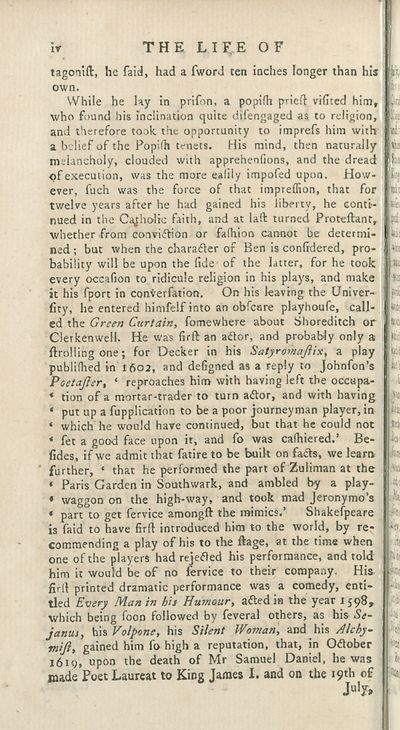Languages & literature > Theatre, tragic & comic > Beaux stratagem; Every man in his humour; The old bachelor; The suspicious husband > Every man in his humour
(36)
Download files
Complete book:
Individual page:
Thumbnail gallery: Grid view | List view

ir THE LIFE OF
tagonlft, he faid, had a fword ten inches longer than his
own.
While he lay in prifon, a popifh pried vidted him,
who found his inclination quite difengaged as to religion,
and therefore took the opportunity to imprefs him with
a belief of the Popifh tenets. His mind, then naturally
melancholy, clouded with apprehenfions, and the dread
^fexecution, was the more ealily impofed upon. How¬
ever, fuch was the force of that impreffion, that for
twelve years after he had gained his liberty, he conti¬
nued in the Catholic faith, and at laft turned Proteftanr,
whether from convidlion or fafhion cannot be determi¬
ned ; but when the charadter of Ben is confidered, pro¬
bability will be upon the fide of the latter, for he took
every occafion to ridicule religion in his plays, and make
it his fport in conVerfation. On his leaving the Univer-
fity, he entered himfelf into an obfcare playhoufe, call¬
ed the Green Curtain, fomewhere about Shoreditch or
Clerkenwell. He was firft an atfor, and probably only a
ftrolling one; for Decker in his Satyromajiix, a play
publifhed in 1602, and defigned as a reply to Johnfon’s
Poetajier, ‘ reproaches him with having left the occupa-
* tion of a mortar-trader to turn ador, and with having
* put up a fupplication to be a poor journeyman player, in
* which he would have continued, but that he could not
* fet a good face upon it, and fo was cafhiered.’ Be-
fides, if we admit that fatire to be built on fads, we learn
further, ‘ that he performed the part of Zuliman at the
‘ Paris Garden in Southwark, and ambled by a play-
* waggon on the high-way, and took mad Jeronymo’s
‘ part to get fervice amongft the mimics.’ Shakefpeare
is faid to have firft introduced him to the world, by re¬
commending a play of his to the ftage, at the time when
one of the players had rejefled his performance, and told
him it would be of no fervice to their company. His
fir ft printed dramatic performance was a comedy, enti¬
tled Every Man in his Humour, aded in the year 1598,
which being foon followed by feveral others, as his Se-
janui, his Volpone, his Silent Woman, and his /Hchy~
tnijl, gained him fo high a reputation, that, in Orftober
1619, upon the death of Mr Samuel Daniel, he was
made Poet Laureat to King James I. and on the 19th of
tagonlft, he faid, had a fword ten inches longer than his
own.
While he lay in prifon, a popifh pried vidted him,
who found his inclination quite difengaged as to religion,
and therefore took the opportunity to imprefs him with
a belief of the Popifh tenets. His mind, then naturally
melancholy, clouded with apprehenfions, and the dread
^fexecution, was the more ealily impofed upon. How¬
ever, fuch was the force of that impreffion, that for
twelve years after he had gained his liberty, he conti¬
nued in the Catholic faith, and at laft turned Proteftanr,
whether from convidlion or fafhion cannot be determi¬
ned ; but when the charadter of Ben is confidered, pro¬
bability will be upon the fide of the latter, for he took
every occafion to ridicule religion in his plays, and make
it his fport in conVerfation. On his leaving the Univer-
fity, he entered himfelf into an obfcare playhoufe, call¬
ed the Green Curtain, fomewhere about Shoreditch or
Clerkenwell. He was firft an atfor, and probably only a
ftrolling one; for Decker in his Satyromajiix, a play
publifhed in 1602, and defigned as a reply to Johnfon’s
Poetajier, ‘ reproaches him with having left the occupa-
* tion of a mortar-trader to turn ador, and with having
* put up a fupplication to be a poor journeyman player, in
* which he would have continued, but that he could not
* fet a good face upon it, and fo was cafhiered.’ Be-
fides, if we admit that fatire to be built on fads, we learn
further, ‘ that he performed the part of Zuliman at the
‘ Paris Garden in Southwark, and ambled by a play-
* waggon on the high-way, and took mad Jeronymo’s
‘ part to get fervice amongft the mimics.’ Shakefpeare
is faid to have firft introduced him to the world, by re¬
commending a play of his to the ftage, at the time when
one of the players had rejefled his performance, and told
him it would be of no fervice to their company. His
fir ft printed dramatic performance was a comedy, enti¬
tled Every Man in his Humour, aded in the year 1598,
which being foon followed by feveral others, as his Se-
janui, his Volpone, his Silent Woman, and his /Hchy~
tnijl, gained him fo high a reputation, that, in Orftober
1619, upon the death of Mr Samuel Daniel, he was
made Poet Laureat to King James I. and on the 19th of
Set display mode to:
![]() Universal Viewer |
Universal Viewer | ![]() Mirador |
Large image | Transcription
Mirador |
Large image | Transcription
| Permanent URL | https://digital.nls.uk/119144420 |
|---|
| Shelfmark | ABS.1.76.323(1)-(4) |
|---|
| Description | Thousands of printed books from the Antiquarian Books of Scotland collection which dates from 1641 to the 1980s. The collection consists of 14,800 books which were published in Scotland or have a Scottish connection, e.g. through the author, printer or owner. Subjects covered include sport, education, diseases, adventure, occupations, Jacobites, politics and religion. Among the 29 languages represented are English, Gaelic, Italian, French, Russian and Swedish. |
|---|

